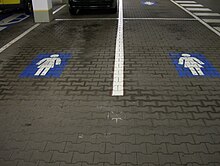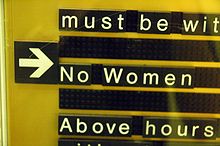
Sex segregation refers to the physical and spatial separation of humans by sex in public or private places.
Understand
Most of the world's countries have male- and female-only prisons, bathrooms, saunas and toilets. A few countries also mandate segregation in shrines, banks, amusement parks, mosques, schools, universities, military service, gyms, stadiums and public transportation. Independent of governmental regulations, some religions reserve sections of houses of worship specifically for men or women or bar the entry of women who are menstruating.
In several countries in Latin America and Asia there are "women only cars" on public transit (usually also open to children up to a certain age) to combat sexual assault and harassment. In other countries, such as much of Europe, such segregation could be seen as discrimination.
Also in countries with little segregation, there are social rules on what is appropriate. A woman could be totally fine with hugging a man she was introduced to the same day – or dancing cheek to cheek with an until-the-dance stranger – while still very much offended by the same man touching her in any but the accepted ways. Some women in such countries may be uneasy with a male stranger sitting next to them in the bus, or sharing an elevator with no other people nearby. Be attentive to their signals, so as not to be intrusive.
Muslims
Some devout Muslims argue that Islam does not permit physical contact with a person of the opposite sex, with the exception of certain immediate family members. Hand shaking between men and women is not encouraged in some majority-Muslim countries such as Saudi Arabia, Iraq, Pakistan, Iran and Afghanistan. As a general rule, in these countries, men are not allowed to get close to or touch women. This taboo can extend to Muslim immigrants to the Western world; as the Independent reported, "the 40-year-old doctor, who left Lebanon for Germany in 2002, said he had promised his wife he would not shake another woman’s hand, and that he was prevented from doing so for religious reasons."
Orthodox Jews
Similarly, many Orthodox Jews do not shake hands between the sexes; if you are introduced to an Orthodox Jew of the opposite sex, take your cues from their behavior and shake their hand if they offer it and you're comfortable with doing so.
Countries and regions with high sex segregation
Saudi Arabia


Saudi Arabia is the most profoundly gender-segregated nation on Earth. Social events are largely predicated on the separation of men and women; the mixing of non-related (in technical terms, non-mahram) men and women at parties and other social gatherings is extremely rare and limited to some of the modernist Western-educated families.
Many (perhaps most) areas of life in Saudi Arabia are segregated by sex to ensure that unrelated men and women have no possibility of "mingling" (khulwa, a punishable crime). Under the rules of segregation, all people are divided into three groups:
- Families. The basic unit of Saudi life, families consist of women accompanied by their mahrams (legal male relatives) — father, brother, husband, uncle, nephew — and children.
- Single men (bachelors). Men not accompanied by their families. Despite common use of the word "bachelor", it is irrelevant whether the man is married or not; a husband will dine in the bachelor section at lunch when he is alone and in the family section at dinner when he is with his wife. It is against the law to be accompanied anywhere by a woman who is not your wife or a family member, and religious police pay particular attention to interracial couples.
- Single women. Women not accompanied by their families. This is by far the most restricted group. Most of the facilities for families will admit single women, but they are never supposed to be allowed in the men's section, and are subject to uncomfortable stares when they are: it is against the law to be accompanied anywhere by a man who is not your husband or a family member (except a hired driver or a taxi driver). The punishment will be worse for the man than for the woman. While the man is forced to sign a written oath not to repeat the offense and may be subject to lashing or prison, women are generally "returned" to their families, with a male family member signing on her behalf. The cultural value placed on "modesty" and "honor" makes the religious police reluctant to openly "out" an offending female and they will try to sweep the problem under the carpet, unless in more "egregious" cases.
Special amusement parks for women, so-called "women parks" have been created. Violation of the principles of sex segregation is known as khalwa. The first female-only trampoline park was established by Bounce in Riyadh in 2018.
Women's banks were an innovation allowed in 1980 to give women a place to put their money without having to have any contact with men. The banks employ women exclusively for every position except for the guards posted at the door to see that no men enter by mistake.
The Labor Ministry has banned the employment of men in stores selling lingerie and other women's garments and perfumes. This policy started in 2005 when the Ministry announced a policy of staffing lingerie shops with women. Since the shops served women customers, employing women would prevent mixing of the sexes in public (ikhtilat).
In September 2017, women were allowed to enter King Fahd Stadium for the first time, for a celebration commemorating the Kingdom's 87th anniversary. They were seated in a specific section for families. Though welcomed by many, the move drew backlash from conservatives holding on to the country's strict gender segregation rules.
Iraq
Women are rarely without a male relative or friend for escort. One should not stand close to, stare at, or touch women.
Iran
Sex segregation of public places such as beaches or swimming pools was ordered and legally introduced after the Islamic revolution in 1979. All schools and some universities are segregated by sex.
Urban buses are divided in two parts. Men are required to get on and off through the front door, while the back section and back doors are intended for women. In bakeries across Iran, men and women must stand in separate lines when buying bread. There are women-only amusement parks in many big and small cities in the country, including Tehran and Shiraz. Women-only phone taxi agencies can be found in every big city. Traditional teahouses (Persian: قهوهخانه) are male-only and females are not allowed to enter stadiums in order to watch men's soccer games. After the Islamic Revolution (1979), seating in all cinemas in the country was sex segregated for several years, but this is no longer the case. Hotels and inns don't host couples without marriage licenses. Only women are permitted in women's boutiques.
While many people like to attend mixed concerts, authorities are against that. In 2014 a concert by Iranian popular pop singer Mohsen Yeganeh was canceled in Urmia in north-west Iran due to sex mingling. Many concerts have been cancelled due to mixing between men and women in Iranian cities.
The first female-only hospital, Mahdieh, was established in 2007 in south Tehran. Female-only hospitals are not common, but most hospitals in Iran have different sections for male and female patients.
In traditional Persian residential architecture the andaruni is a part of the house in which the private quarters are established. This is specifically where the women of the house are free to move about without being seen by an outsider (non-mahram). Old homes had two door knockers, one for men and the other for women, though modern houses have only a single doorbell.
India
.jpg/220px-Women_Only_car_(5847634172).jpg)
In India, airport security is sex segregated, with separate queues for men and women.
- Kerala: sex segregation is mandatory in temple ponds and certain public ghats. In any public transport like buses, the front rows are reserved for ladies, and men are not expected to sit there, even if the seats are unoccupied. Likewise, there are some lady coaches in trains, where only women, girls, and pre-pubescent male children are admitted.
Israel
While Haredim-oriented bus routes used to enforce gender segregation, anti-discrimination rulings by the Israeli supreme court have made this practice illegal; where it does occur, expect media scandals to ensue. However, Haredim will still voluntarily practice gender segregation and move to another seat or stand if someone of the opposite sex sits next to them on a bus. In general, visitors should be respectful of Orthodox Jewish and Muslim customs on modesty, and might consider not reaching out to shake the hand of a person of the opposite sex who's dressed in what looks like modest, conservative clothing, unless they offer their hand first. It's safer to use the universal Hebrew greeting, Shalom aleichem (peace be unto you) and the response Aleichem shalom, or the equivalents in Arabic: Salaam aleikum and Aleikum wassalam. Haredi neighborhoods, particularly in Jerusalem, will often have signs at the entrance informing visitors of the customs, and asking visitors to respect them. In addition to "modesty", they also concern respecting the Jewish Sabbath and other Jewish holidays.
Liberal Israeli Jews do not practice sex segregation at all, and the liberal city of Tel Aviv is similar to many European cities in that there are typically crowds wearing bikinis and swim trunks on the beach in good weather, and you will see many lovers walking hand in hand on the streets.
Japan
According to a poll in 2017, nearly 70 percent of women in Tokyo back the single-sex carriages introduced in the city in 2000 to combat a phenomenon commonly known as chikan, or groping, on trains. But the policy has been criticized, including by a group of men who boarded a women-only carriage in 2018 to protest what they called a discriminatory practice.

Lebanon
In Lebanon, male passengers are not allowed to get on pink women-only cabs (Arabic: Banet Taxi).
